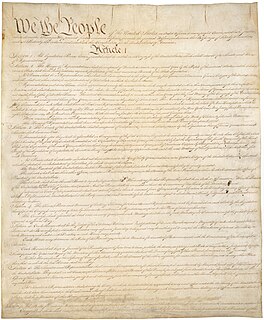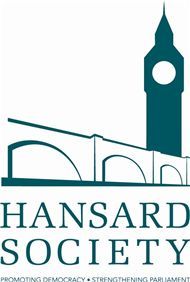Related Research Articles
The politics of Canada function within a framework of parliamentary democracy and a federal system of parliamentary government with strong democratic traditions. Canada is a constitutional monarchy, in which the monarch is head of state. In practice, the executive powers are directed by the Cabinet, a committee of ministers of the Crown responsible to the elected House of Commons of Canada and chosen and headed by the Prime Minister of Canada.

Legislation is the process or product of enrolling, enacting, or promulgating law by a legislature, parliament, or analogous governing body. Before an item of legislation becomes law it may be known as a bill, and may be broadly referred to as "legislation" while it remains under consideration to distinguish it from other business. Legislation can have many purposes: to regulate, to authorize, to outlaw, to provide (funds), to sanction, to grant, to declare, or to restrict. It may be contrasted with a non-legislative act by an executive or administrative body under the authority of a legislative act.

Parliamentary procedure is the accepted rules, ethics, and customs governing meetings of an assembly or organization. It is supposed to represent the will of the majority. Its object is to allow deliberation upon questions of interest to the organization and to arrive at the sense or the will of the assembly upon these questions. Self-governing organizations follow parliamentary procedure to debate and reach group decisions—usually by vote—with the least possible friction.
The Canadian Charter of Rights and Freedoms, often simply referred to as the Charter in Canada, is a bill of rights entrenched in the Constitution of Canada, forming the first part of the Constitution Act, 1982. The Charter guarantees certain political rights to Canadian citizens and civil rights of everyone in Canada from the policies and actions of all areas and levels of the government. It is designed to unify Canadians around a set of principles that embody those rights. The Charter was signed into law by Queen Elizabeth II of Canada on April 17, 1982, along with the rest of the Act.

A Commonwealth realm is a sovereign state that has Elizabeth II as its monarch and head of state. Each realm functions as an independent state, equal with the other realms.
A constitutional convention is an informal and uncodified procedural agreement that is followed by the institutions of a state. In some states, notably those Commonwealth of Nations states that follow the Westminster system and whose political systems derive from British constitutional law, most government functions are guided by constitutional convention rather than by a formal written constitution. In these states, actual distribution of power may be markedly different from those the formal constitutional documents describe. In particular, the formal constitution often confers wide discretionary powers on the head of state that, in practice, are used only on the advice of the head of government, and in some cases not at all.
The Cabinet of Canada is a body of ministers of the Crown that, along with the Canadian monarch, and within the tenets of the Westminster system, forms the government of Canada. Chaired by the prime minister, the Cabinet is a committee of the Queen's Privy Council for Canada and the senior echelon of the Ministry, the membership of the Cabinet and ministry often being co-terminal; as of November 2015 there are no members of the latter who are not also members of the former.

The legal system of Canada is pluralist: its foundations lie in the English common law system, the French civil law system and Indigenous law systems developed by the various Indigenous Nations, such as Plains Cree wiyasowêwina or Inuit Qaujimajatuqangit.
Nonpartisan democracy is a system of representative government or organization such that universal and periodic elections take place without reference to political parties. Sometimes electioneering and even speaking about candidates may be discouraged, so as not to prejudice others' decisions or create a contentious atmosphere.

The government of Canada is the body responsible for the federal administration of Canada. A constitutional monarchy, the Crown is the corporation sole, assuming distinct roles: the executive, as the Crown-in-Council; the legislature, as the Crown-in-Parliament; and the courts, as the Crown-on-the-Bench. Three institutions—the Privy Council ; the Parliament of Canada; and the judiciary, respectively—exercise the powers of the Crown.
Governance is all the processes of interactions be they through the laws, norms, power or language of an organized society over a social system. It is done by the government of a state, by a market, or by a network. It is the decision-making among the actors involved in a collective problem that leads to the creation, reinforcement, or reproduction of social norms and institutions". In lay terms, it could be described as the political processes that exist in and between formal institutions.

Jerry S. Grafstein, B.A., J.D., Q.C., is a Canadian lawyer, businessman, and politician who served in the Senate of Canada from 1984 to 2010. Grafstein was the longest-serving member of the Standing Senate Committee on Foreign Affairs and International Trade. He served as co-chair of the Canada-United States Inter-Parliamentary Group and as a senior officer of the Organization for Security and Co-Operation in Europe (OSCE) Parliamentary Assembly for over a decade.

The Hansard Society was formed in the United Kingdom in 1944 to promote parliamentary democracy. Founded and chaired by Commander Stephen King-Hall, the first subscribers were Winston Churchill and Clement Attlee. The Society's co-Presidents are the Speaker of the House of Commons, Sir Lindsay Hoyle, and the Lord Speaker, The Baron Fowler, and the Vice-Presidents are the leaders of the Labour, Conservative and Liberal Democrat parties. The Society is named after the Hansard Parliamentary Record, which publishes the proceedings of the British parliament.
Fusion of powers is a feature of some parliamentary forms of government where different branches of government are intermingled, typically the executive and legislative branches. It is contrasted with the separation of powers found in presidential and semi-presidential forms of government where the legislative and executive powers are in origin separated by popular vote. Fusion of powers exists in many, if not a majority of, parliamentary democracies, and does so by design. However, in all modern democratic polities the judiciary does not possess legislative or executive powers.

Israel Democracy Institute, established in 1991, is an independent center of research and action dedicated to strengthening the foundations of Israeli democracy. It is located in Jerusalem, Israel.
PRS Legislative Research, commonly referred to as PRS, is an Indian non-profit organisation that was established in September 2005 as an independent research institute to make the Indian legislative process better informed, more transparent and participatory. PRS is based in New Delhi.
The social sciences are the sciences concerned with societies, human behaviour, and social relationships.
Ritu Birla is an historian of modern South Asia. She is an associate Professor of History, is Richard Charles Lee Director of the Asian Institute, and former Director of the Centre for South Asian Studies at the Munk School of Global Affairs at the University of Toronto.
A law clerk, sometimes called parliamentary counsel, is an officer in some parliamentary systems. The law clerk is charged with providing advice on legal issues and parliamentary procedure to the Speaker and members of the chamber. The position is neutral and non-partisan.
Nina Yurievna Belyaeva is a Russian public policy researcher, PhD, professor and head of the Public Policy Department. at National Research University Higher School of Economics, Moscow, Russia. Member of Russian Political Science Association, which is a part of IPSA.
References
- ↑ See Commonwealth Law Bulletin, Volume 34, Issue 3 September 2008 , pages 685 - 690 for public announcement.
- ↑ See Corporations Canada - Letters of Patent, File Number 447384-1 [ permanent dead link ]